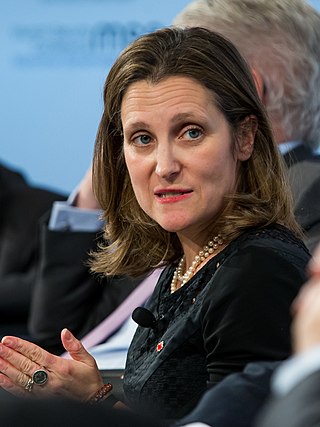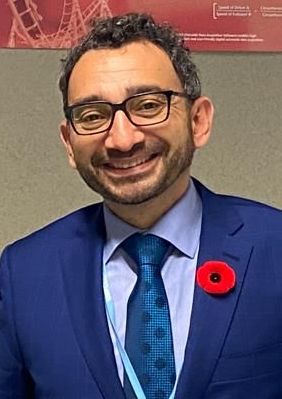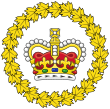
The deputy prime minister of Canada is a minister of the Crown and a member of the Canadian Cabinet. The office is conferred at the discretion of the prime minister and does not have an associated departmental portfolio. Canadian deputy prime ministers are appointed to the Privy Council and styled as the Honourable, a privilege maintained for life.
The Cabinet of Canada is a body of ministers of the Crown that, along with the Canadian monarch, and within the tenets of the Westminster system, forms the government of Canada. Chaired by the prime minister, the Cabinet is a committee of the King's Privy Council for Canada and the senior echelon of the Ministry, the membership of the Cabinet and ministry often being co-terminal; as of November 2015 there were no members of the latter who were not also members of the former.
The minister of Science is a vacant office that was in the Cabinet of Canada and existed under various forms from 1971 to 2019, when the portfolio's responsibilities were absorbed into the innovation, science and industry portfolio.

The premier of Ontario is the head of government of Ontario. Under the Westminster system, the premier governs with the confidence of a majority the elected Legislative Assembly; as such, the premier typically sits as a member of Provincial Parliament (MPP) and leads the largest party or a coalition of parties. As first minister, the premier selects ministers to form the Executive Council, and serves as its chair. Constitutionally, the Crown exercises executive power on the advice of the Executive Council, which is collectively responsible to the legislature.

The government of Canada is the body responsible for the federal administration of Canada. A constitutional monarchy, the Crown is the corporation sole, assuming distinct roles: the executive, as the Crown-in-Council; the legislature, as the Crown-in-Parliament; and the courts, as the Crown-on-the-Bench. Three institutions—the Privy Council ; the Parliament of Canada; and the judiciary, respectively—exercise the powers of the Crown.

The minister of innovation, science, and industry is the minister of the Crown in the Canadian Cabinet who is responsible for overseeing the economic development and corporate affairs department of the Government of Canada; Innovation, Science and Economic Development Canada.

Dominic A. LeBlanc is a Canadian lawyer and politician who has served as the minister of intergovernmental affairs since 2020 and also became the minister of infrastructure and communities in 2021. A member of the Liberal Party, LeBlanc sits as the member of Parliament (MP) for Beauséjour, representing the New Brunswick riding in the House of Commons since 2000. He has held a number of Cabinet portfolios throughout his tenure in government.
The Minister of International Trade Diversification was a minister of the Crown position in the Canadian Cabinet who was responsible for the federal government's international trade portfolio.

The Privy Council Office is the central agency of the Government of Canada which acts as the secretariat to the Cabinet of Canada – a committee of the King's Privy Council for Canada – and provides non-partisan advice and support to the Canadian ministry, as well as leadership, coordination, and support to the departments and agencies of government.
Patriation is the political process that led to full Canadian sovereignty, culminating with the Constitution Act, 1982. The process was necessary because under the Statute of Westminster 1931, with Canada's agreement at the time, the British parliament had retained the power to amend Canada's Constitution Acts, and to enact more generally for Canada at the request and with the consent of the Dominion. That authority was removed from the UK by the enactment of the Canada Act 1982 on March 29, 1982, by the Parliament of the United Kingdom, as requested by the Parliament of Canada.
The president of the Treasury Board is a minister of the Crown in the Canadian Cabinet. The president is the chair of the Treasury Board of Canada and is the minister responsible for the Treasury Board Secretariat, the central agency which is responsible for accounting for the Government of Canada's fiscal operations.

The minister of transport is a minister of the Crown in the Canadian Cabinet. The minister is responsible for overseeing the federal government's transportation regulatory and development department, Transport Canada, as well as Canada Post, the Saint Lawrence Seaway, Nav Canada, and the Port Authority system. Since 12 January 2021, the position has been held by Omar Alghabra of the Liberal Party.
The following list outlines the structure of the federal government of Canada, the collective set of federal institutions which can be grouped into the legislative, executive, and judicial branches. In turn, these are further divided into departments, agencies, and other organizations which support the day-to-day function of the Canadian state.
The Intergovernmental Affairs Secretariat is a government agency of Canada that is part of the Privy Council Office. Directed by a deputy minister, it supports the Minister of Intergovernmental Affairs and, through the Clerk of the Privy Council and Secretary to the Cabinet, the Prime Minister of Canada and Cabinet, with respect to policy and communications in such areas as federal-provincial-territorial relations, Aboriginal affairs, the evolution of the federation and Canadian unity.

The minister of official languages is a minister of the Crown in the Canadian Cabinet.
Infrastructure Canada (INFC) is a department of the Government of Canada responsible for the federal public infrastructure policy. Construction and development of infrastructure is primarily the responsibility of provincial/territorial and municipal governments, as such, much of the department's work involves co-financing projects with other levels of government.

The government of Ontario is the body responsible for the administration of the Canadian province of Ontario. A constitutional monarchy, the Crown—represented in the province by the lieutenant governor—is the corporation sole, assuming distinct roles: the executive, as the Crown-in-Council; the legislature, as the Crown-in-Parliament; and the courts, as the Crown-on-the-Bench. The functions of the government are exercised on behalf of three institutions—the Executive Council; the Provincial Parliament ; and the judiciary, respectively. Its powers and structure are partly set out in the Constitution Act, 1867.
Since the Constitution of Canada was patriated, in 1982, ten Amendments to the Constitution of Canada have been passed. There have, however, been a number of unsuccessful attempts to amend the Constitution in accordance with its amending formula.

Christina Alexandra Freeland is a Canadian politician serving as the tenth and current deputy prime minister of Canada since 2019 and the minister of finance since 2020. A member of the Liberal Party, Freeland represents the Toronto riding of University—Rosedale in the House of Commons. She was first appointed to Cabinet following the 2015 federal election and is the first woman to hold the finance portfolio.

The Twenty-Ninth Canadian Ministry is the Cabinet, chaired by Prime Minister Justin Trudeau, that began governing Canada shortly before the opening of the 42nd Parliament. The original members were sworn in during a ceremony held at Rideau Hall on November 4, 2015. Those who were not already members of the privy council were sworn into it in the same ceremony. The Cabinet currently consists of 35 members including Trudeau, with 17 women and 18 men. When the ministry was first sworn in, with fifteen men and fifteen women, it became the first gender-balanced cabinet in Canadian history.






















